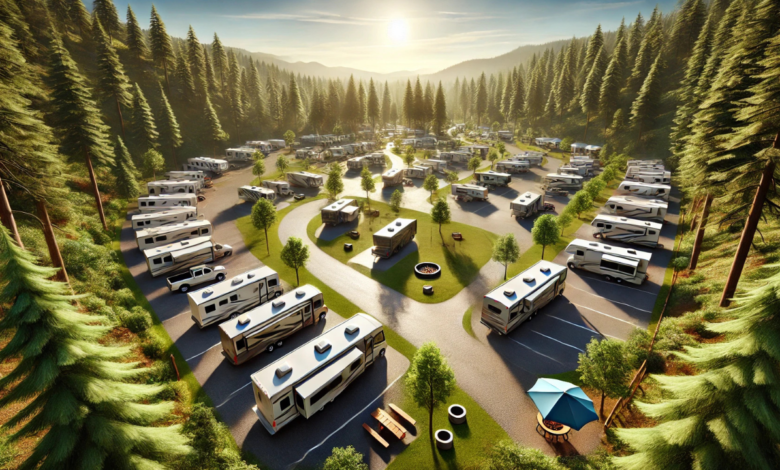rv campgrounds near me Top Tips and Best Options

RV camping is an exciting way to explore the great outdoors and create lasting memories with family and friends. rv campgrounds near me Whether you’re a seasoned RV traveler or a first-timer, finding the right campground is essential to making the most of your adventure. With thousands of RV campgrounds scattered across the country, knowing where to look can feel overwhelming. This guide will help you find the best RV campgrounds near your location and share essential tips for choosing a spot that suits your needs and preferences.
How to Find RV Campgrounds Near You
When it comes to RV camping, location is everything. Choosing the right spot can make or break your experience, so it’s crucial to find a campground that is easily accessible and close to your desired attractions. Thankfully, several tools and platforms help you discover RV campgrounds near you.
One of the most popular and straightforward methods is using Google Maps. Simply type in “RV campgrounds near me” or “RV parks nearby,” the map will display nearby options, along with user ratings, photos, and contact information. Search engines also provide a wealth of resources for finding campgrounds, as they list directories and detailed reviews for a comprehensive look at various parks.
Platforms like Campendium, RV Parky, and AllStays are great places to explore for RV-specific options. These websites and apps allow users to filter results based on criteria such as amenities, price, and proximity to attractions. These sites also feature user reviews and photos, helping you make an informed decision before booking. Additionally, local tourism websites and visitor centers are valuable resources for finding hidden gems, especially when traveling to more remote locations.
Factors to Consider When Choosing an RV Campground

Choosing an RV campground goes beyond simply finding one that’s nearby. To ensure a comfortable and enjoyable stay, several factors must be considered when selecting the right park for your trip.
Accessibility is a primary consideration. The campground should be easy to reach, preferably near significant highways or main roads that make your arrival and departure hassle-free. Look for places that are not too remote unless you’re seeking seclusion, as this can make restocking and finding emergency services difficult.
Next, consider the amenities offered by the campground. Many RV parks provide full hookups, including electric, water, and sewage connections. If you’re staying at a more rustic site, they offer a dump station to empty your waste tank. Some campgrounds also offer Wi-Fi, cable TV, and cell phone service, which can be essential for those who prefer staying connected. You’ll also want to look for restrooms, showers, and laundry facilities to make your stay more comfortable.
Pet policies are another critical factor to consider. Many RV parks are pet-friendly, but they may have restrictions regarding the size of pets, leash requirements, or designated pet areas. If traveling with a furry companion, ensure the campground allows pets and offers suitable facilities.
Lastly, check for recreational activities at the campground. Many parks near hiking trails, fishing spots, and biking paths provide opportunities to explore nature right from your campsite. Some campgrounds even have on-site amenities like swimming pools, sports courts, or kids’ play areas, perfect for family vacations.
Types of RV Campgrounds
The RV campground landscape is diverse, with different types of parks catering to various needs and preferences. Understanding these types will help you decide which one fits your style of travel and camping.
Public campgrounds are typically operated by government agencies such as the National Park Service, U.S. Forest Service, or Bureau of Land Management. They are often located in or near National Parks, State Parks, and national forests. They offer a more rustic experience, limited amenities, and fewer crowds, making them perfect for those seeking nature immersion. Many public campgrounds offer hike-in sites or backcountry camping for a truly off-the-grid experience. Reservations are recommended for these campgrounds, especially during peak seasons, as they can fill up quickly.
On the other hand, private RV parks are commercial campgrounds that often cater to travelers seeking additional comfort and amenities. These parks might include features like swimming pools, hot tubs, and restaurant services, making them ideal for families or those who want a more luxurious camping experience. Private RV parks are commonly found near major cities, tourist attractions, and popular recreational areas. They tend to have more availability, but the prices can be higher than public options.
RV resorts are above typical RV parks, offering high-end amenities and services. These can include golf courses, spas, and organized activities. Resorts cater to those who prefer a combination of relaxation and recreation while still enjoying the freedom of RV living.
How to Book an RV Campground Near You
Booking an RV campground is crucial to ensure your spot and avoid disappointment, especially during peak seasons. Here’s a rundown of the best ways to make a reservation.
Online reservation systems are the most convenient way to book an RV campground. Many campgrounds offer their booking portals on their websites. For a more comprehensive search, platforms like ReserveAmerica, Campground Reservations, and Hipcamp provide a wide range of options with the ability to filter by location, dates, and amenities. These platforms also allow you to secure a spot in advance, often at discounted rates for early bookings.
Sometimes, you should call ahead and make a reservation directly with the campground, particularly if you’re visiting a smaller or more remote location. Calling is also helpful for special requests, such as a pull-through site or specific amenities. Double-checking your booking details, including the check-in time and additional fees, is always a good idea.
Walk-ins are often allowed for those who love the thrill of spontaneity, though availability may be limited. Many campgrounds operate on a first-come, first-served basis, so arriving early is key. If your preferred campground is complete, it’s wise to have a backup plan during busy times.
Conclusion
Finding the perfect RV campground near you involves researching, preparing, and considering your preferences. Whether you prefer a remote, nature-filled experience or a luxurious RV resort, there’s something for everyone in the diverse RV camping world. Utilizing this guide’s tools and tips, you can confidently choose a campground that meets your needs, ensuring your RV adventure is memorable.
FAQs
What’s the difference between a private RV park and a public RV campground?
Government entities operate public campgrounds and offer a more rustic experience, while private parks provide more amenities and are typically commercial operations.
Are there RV campgrounds with full hookups?
Many RV parks offer full hookups, including electric, water, and sewage connections.
How far in advance should I book an RV campground?
It’s advisable to book as early as possible, especially during peak seasons, to guarantee your spot.
Can I find RV campgrounds near popular tourist spots?
Many RV parks near major tourist attractions offer easy access to sightseeing opportunities.
Do I need to have reservations at all RV campgrounds?
Reservations are recommended, particularly for popular or remote areas, but some campgrounds operate on a first-come, first-served basis.
What amenities do RV campgrounds typically offer?
Standard amenities include electrical hookups, water, sewage, Wi-Fi, showers, and sometimes recreational activities like fishing or hiking.
Are RV parks pet-friendly?
Many RV parks are pet-friendly, but policies vary by location, so it’s best to check ahead.
How do I ensure I get a good spot at a busy campground?
Arriving early or booking in advance increases your chances of securing a preferred spot.
Can I camp in my RV at National Parks?
Yes, many National Parks have RV campgrounds, but they can fill up quickly during peak seasons.
What are some tips for staying safe in an RV campground?
Always lock your doors, keep valuables secure, and be mindful of your surroundings. Some campgrounds also have security personnel or surveillance cameras.
You May Also Read: https://usabuzzwire.com/40-statements-of-who-god-says-i-am/




